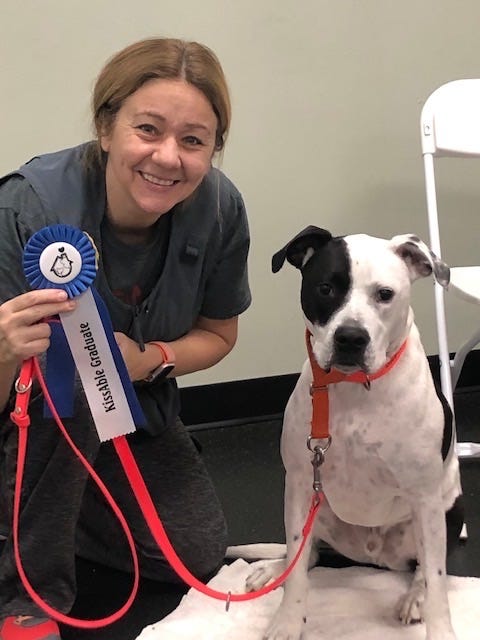I’ve thought about this letter to Cesar Millan for many years, probably a good decade.
It’s a specific thank you in regards to his tv show that started in 2004 in the US. I started my dog training career at the same time. Specifically, helping people with behavior change needs in their family dog. This people side of the relationship equation has always been important to me.
What Mr Millan did for the US training industry definitely was a moment. Pet owners saw first hand that they could call someone to come to their house to help their dog at home. Yes, and in a quick 15 minutes, including commercials. So while he’s launching his dog training TV show from the West Coast here I was on the East Coast already being called upon.
And that call would go something like this from a potential client: “I was watching Cesar, love that guy, and my dog does the same thing! When can you see us?”
But there was a second part to the call: “ I tried what Cesar does, Ssht!, and it’s not working.”
Thankfully, the client has called me to support them in their learning and training journey.
For everything that Cesar Millan did for the training industry, it perpetuated an approach and mindset that is old fashioned and does not take into account the long term mental impact on the dog. Short term outcomes are brilliant for tv and unfortunately, that was the niche. That’s what made good television.
The opportunities that came to me from his tv show included people learning that they could live differently with their pet, that adjusting their own behavior could influence their dog’s behavior, and to seek someone sooner rather than later.
What his show didn’t do (Google the training fall out, it’s everywhere online) is explore the nuances of the human-animal bond where both members of that relationship can see what “no” looks like and honor it. A dog having the ability to say “No” is important information and has value in understanding the dog in front of you. It fell short when it came to reducing shame in owning a dog thought to have “bad behavior” or give long term tools that prioritized safety, relationship and the art of making a request.
My client conversations sounded very standard in the beginning; focused on what the owner wanted, how the dog needed to change, how clean technique would get them there.
The difference with my approach was the conversations nearly always included how to understand the dog’s requests, the subtleties of their body movements, how they navigate space, where in growth and development they are in life, encouragement to meet the dog’s playfulness and to look at reinforcers as communication tools, not just a verdict of good or bad behavior. I connected with the human by sharing knowledge on the how and why of their dog’s behavior.
The training sessions transformed when the discussions included what the clients’ real needs were for success. The full picture of a client and dog’s relationship involved circumstances such as: navigating a dog’s high needs with the owner’s work/life balance, preparing the home for a new human baby, bringing home a second dog/cat/guinea pig, safe & clever ways to involve the dog into a kid’s daily routine, bringing home a puppy in your 70s, exploring individual mobility needs, grieving the death of a pet, how divorce and the dog work out, meaningful ways differently-abled humans can train, bringing home a rescue dog while caretaking for a spouse with Alzheimer’s and the list goes on. It wasn’t just the need to make the dog behave, it was creating a space where the client’s whole lived experience could be expressed: the thoughts, feelings and circumstances of their life.
My thank you letter to Mr Millan would go something like this:
Dear Mr Millan:
While you were on TV, I was in the homes of people curious to learn how to improve connection with their dog so that both sides of the relationship equation, the dog AND the human are considered. That conversation started when my own clients felt safe, heard, grounded and supported. Thank you for being a start to a conversation.
Sincerely, Lisa Tudor
The conversation started and I was grateful to continue it from a place of compassion, curiosity and empowerment for all those included. I didn’t know it at the time, but I was already in my life coaching career.



